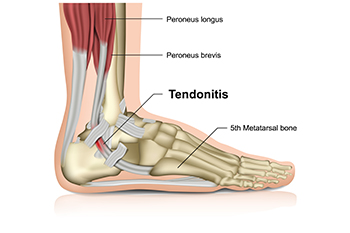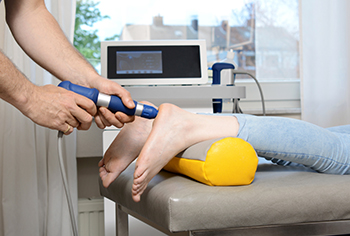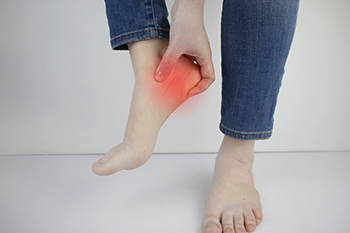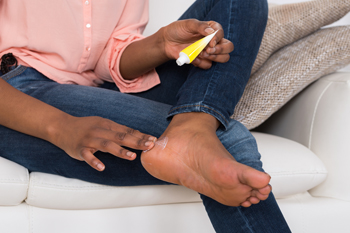Items filtered by date: February 2023
Older People and Achilles Tendonitis

Tendonitis is common among people who incur an Achilles tendon injury. Heel and calf pain often accompany this ailment, and it can be uncomfortable. The Achilles tendon connects the calf muscle to the heel and may become torn from an injury. These can include overuse injuries from running on hard surfaces or increasing speed and distance too quickly while running. People who have arthritis may be prone to Achilles tendonitis, and it can affect older and middle-aged patients more than younger adults. Common symptoms are immediate heel pain and difficulty pointing and flexing the foot. Additionally, the area may be warm and tender to the touch. A proper diagnosis is needed to rule out the possibility of a fracture. If you have endured an Achilles tendon injury, it is suggested that a podiatrist be consulted who can effectively help you manage this condition.
Achilles tendon injuries need immediate attention to avoid future complications. If you have any concerns, contact Dr. Tupper of Coshocton Foot Health Center. Our doctor can provide the care you need to keep you pain-free and on your feet.
What Is the Achilles Tendon?
The Achilles tendon is a tendon that connects the lower leg muscles and calf to the heel of the foot. It is the strongest tendon in the human body and is essential for making movement possible. Because this tendon is such an integral part of the body, any injuries to it can create immense difficulties and should immediately be presented to a doctor.
What Are the Symptoms of an Achilles Tendon Injury?
There are various types of injuries that can affect the Achilles tendon. The two most common injuries are Achilles tendinitis and ruptures of the tendon.
Achilles Tendinitis Symptoms
- Inflammation
- Dull to severe pain
- Increased blood flow to the tendon
- Thickening of the tendon
Rupture Symptoms
- Extreme pain and swelling in the foot
- Total immobility
Treatment and Prevention
Achilles tendon injuries are diagnosed by a thorough physical evaluation, which can include an MRI. Treatment involves rest, physical therapy, and in some cases, surgery. However, various preventative measures can be taken to avoid these injuries, such as:
- Thorough stretching of the tendon before and after exercise
- Strengthening exercises like calf raises, squats, leg curls, leg extensions, leg raises, lunges, and leg presses
If you have any questions please feel free to contact our office located in Coshocton, OH . We offer the newest diagnostic tools and technology to treat your foot and ankle needs.
Shockwave Therapy for Plantar Fasciitis

Many people seek help for pain from plantar fasciitis, an inflammation of the band of tissue that runs beneath the foot from the toes to the heel. Some simple remedies for plantar fasciitis include rest, exercise, and medication. It has also been found that shockwave therapy can be effective in reducing pain and helping to heal the plantar fascia. This non-invasive treatment consists of applying penetrating waves of ultrasound energy into the inflamed area. The body responds by creating new blood vessels and stimulates nerve endings that can help to heal the area. While the treatment occurs without any surgery, it can be painful. Sometimes multiple treatments are required, depending on the severity of the plantar fasciitis. Results of shockwave therapy may vary, but most commonly the pain of plantar fasciitis subsides. Fortunately, there are many ways to treat symptoms of plantar fasciitis. Please consult a podiatrist for more information on the treatment options that are best for you.
Shockwave therapy is a treatment commonly used to treat various injuries and conditions, particularly plantar fasciitis in the feet. To learn more, consult with Dr. Tupper from Coshocton Foot Health Center. Our doctor can provide the care you need to keep you pain-free and on your feet.
Shockwave Therapy
Shockwave therapy is a new treatment option designed to treat bone conditions such as tennis elbow, shoulder pain, and others. Shockwave therapy uses high intensity sound waves that are directed to the affected tissues of the body with pinpoint accuracy. The effects are very beneficial, leading to a production of collagen fibers, eliminating inflammation.
Who Benefits from Shockwave?
Shockwave is recommended for patients suffering from heel pain and associated problems. Heel pain is a common condition which can be caused by obesity, overexertion, and spending a substantial amount of time on hard floors with your feet exposed and unsupported.
Fast and Easy
The therapy is actually a simple process that can leave patients feeling better the very next day. Shockwave therapy is not as dramatic as it sounds. It enables more blood flow to effected areas, addressing the source of the problem and allowing treatment to last for a long time.
Treatment & Recovery Time
Shockwave treatment will enable your feet to recover quickly. This is especially important since surgery is not required. It is cost effective and does not require the use of anesthesia. This treatment is a better option to surgery, since it is proven safe.
If you have any questions, please feel free to contact our office located in Coshocton, OH . We offer the newest diagnostic and treatment technologies for all your foot and ankle needs.
Possible Relief Methods for Plantar Fasciitis

Many athletes suffer from a foot condition that is known as plantar fasciitis. It is a common ailment that comes from the repetitive force while participating in running and jumping activities. It may also affect people who wear shoes that do not fit correctly, or who have an abnormal foot structure. Additionally, it may happen to people who stand on hard surfaces for most of the day, or increase speed and distance too quickly while running. Plantar fasciitis happens as a result of an inflammation of the plantar fascia, which is the band of tissue that is found on the sole of the foot. It connects the heel to the toes, and an injury or a tear to the plantar fascia may result in the development of this condition. Heel pain is a common symptom of plantar fasciitis, and it may be worse in the morning after arising. Relief may be found when weight is kept off of the affected foot, and is frequently elevated while resting. Some patients have found success when specific stretches are done, and this may help to accelerate healing. If you have heel pain, it is strongly advised that you are under the care of a podiatrist who can properly diagnose and treat plantar fasciitis.
Plantar fasciitis can be very painful and inconvenient. If you are experiencing heel pain or symptoms of plantar fasciitis, contact Dr. Tupper from Coshocton Foot Health Center. Our doctor can provide the care you need to keep you pain-free and on your feet.
What Is Plantar Fasciitis?
Plantar fasciitis is the inflammation of the thick band of tissue that runs along the bottom of your foot, known as the plantar fascia, and causes mild to severe heel pain.
What Causes Plantar Fasciitis?
- Excessive running
- Non-supportive shoes
- Overpronation
- Repeated stretching and tearing of the plantar fascia
How Can It Be Treated?
- Conservative measures – anti-inflammatories, ice packs, stretching exercises, physical therapy, orthotic devices
- Shockwave therapy – sound waves are sent to the affected area to facilitate healing and are usually used for chronic cases of plantar fasciitis
- Surgery – usually only used as a last resort when all else fails. The plantar fascia can be surgically detached from the heel
While very treatable, plantar fasciitis is definitely not something that should be ignored. Especially in severe cases, speaking to your doctor right away is highly recommended to avoid complications and severe heel pain. Your podiatrist can work with you to provide the appropriate treatment options tailored to your condition.
If you have any questions please feel free to contact our office located in Coshocton, OH . We offer the newest diagnostic and treatment technologies for all your foot and ankle needs.
Cracked Heels and the Winter

Cracked heels are not one of the most severe and health-threatening conditions that might affect the feet. However, it is nonetheless an unpleasant and unsightly condition that many individuals will be wise to try to avoid. Cracked heels occur when the skin on the back of the heel becomes tough and the skin creates fissures due to a lack of moisture. Interestingly, cracked heels have a notable relationship with seasonality and temperature. Specifically, when winter arrives and the temperature drops considerably, an individual may be more susceptible to developing cracked heels. This phenomenon can be explained by the fact that it is often dry in cold weather. As a result, this dryness can impact the heels of the feet, reducing existing moisture in the heels. Please contact a podiatrist today if you would like more information about this foot condition.
Cracked heels are unsightly and can cause further damage to your shoes and feet. If you have any concerns, contact Dr. Tupper from Coshocton Foot Health Center. Our doctor can provide the care you need to keep you pain-free and on your feet.
Cracked Heels
Cracked heels appear unappealing and can make it harder for you walk around in sandals. Aside from looking unpleasant, cracked heels can also tear stockings, socks, and wear out your shoes. There are several methods to help restore a cracked heel and prevent further damage.
How Do You Get Them?
Dry skin is the number one culprit in creating cracked heels. Many athletes, walkers, joggers, and even swimmers suffer from cracked heels. Age and skin oil production play a role to getting cracked heels as well.
Promote Healing
Over the counter medicines can help, especially for those that need instant relief or who suffer from chronic dry feet.
Wear Socks – Wearing socks with medicated creams helps lock in moisture.
Moisturizers – Applying both day and night will help alleviate dryness which causes cracking.
Pumice Stones – These exfoliate and remove dead skin, which allows for smoother moisturizer application and better absorption into the skin.
Change in Diet
Eating healthy with a well-balanced diet will give the skin a fresh and radiant look. Your body responds to the kinds of food you ingest. Omega-3 fatty acids and zinc supplements can also revitalize skin tissue.
Most importantly, seek professional help if unsure how to proceed in treating cracked heels. A podiatrist will help you with any questions or information needed.
If you have any questions, please feel free to contact our office located in Coshocton, OH . We offer the newest diagnostic and treatment technologies for all your foot care needs.


